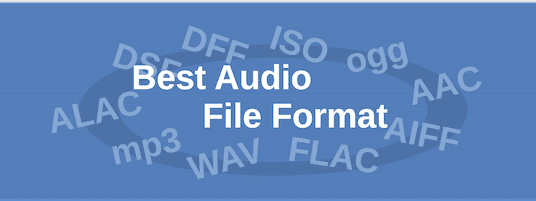
• what are the best and highest quality audio file formats, such as:
WAV, FLAC, mp3, AIFF, m4a, AAC, ALAC, PCM, DSD, DSF, DFF, SACD;
• what are the advantages and disadvantages of lossy and lossless digital data compression,
• what are the differences between PCM and DSD formats,
• what are the best audio formats for Android, iOS, Mac, Windows, Linux devices,
• the answers to the most frequently asked questions about music file types,
• how to choose the best audio codec for you with the help of an infographic.

If you buy "AuI ConverteR PROduce-RD" (2023/12.x version) from 24 August 2023 to 24 October 2023, you will get free update to version 2024 (13.x) after its release.
- What is an audio codec and format?
- What is highest quality audio format?
- Lossy vs lossless audio formats
- Audio codec comparison
- Why different sound formats are need
- The best music formats (codecs)
- Lossless PCM formats (codecs)
- Lossy PCM formats (codecs)
- DSD formats
- Bluetooth audio codecs
- Audio formats for iTunes
- What is the best music formats? Conclusions
- Frequently Asked Questions
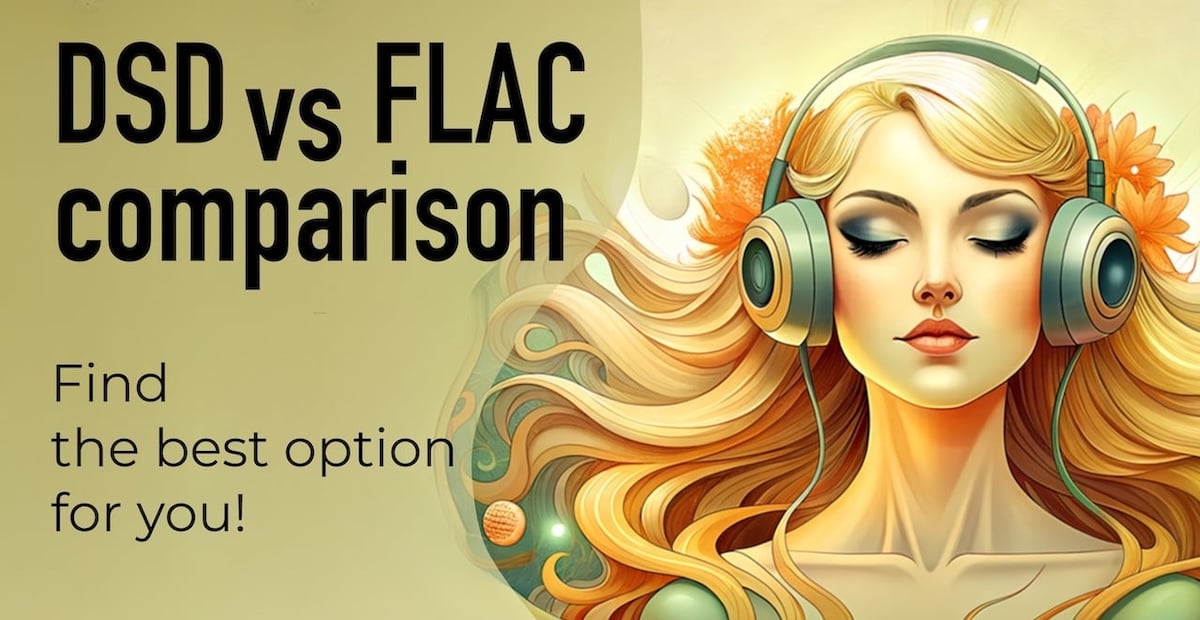
What is an audio codec and format?
Audio codec is a program that changes how sound is stored.
Audio format is the way sound is saved in a file or stream. The format tells what kind of data blocks are used, how they are compressed, what information they have, and how they are arranged.
An encoder makes the sound data smaller or different. A decoder makes it normal again. Audio codec is a program that can do both.
Original sound data is a series of numbers.
Usually, audio codecs are part of audio conversion software and devices that play sound.
Some examples of audio codec types are:
mp3 codec, flac codec, aac codec, and others.
Back to top
What is highest quality audio format?
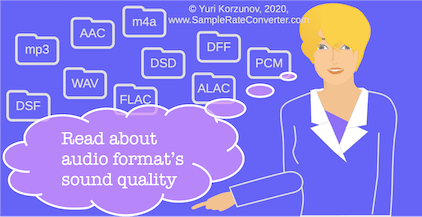
In this section, we will see what is the best audio format for high sound quality.
Codec is a program that changes how sound is stored. It can make sound data smaller or different. This can save space and speed up loading or streaming. Let's see how codec works.
We can think of music as a series of balls with different sizes.
We can use numbers to represent the balls:
Small ball is number "1".
Middle ball is "2".
Big ball is "3".
No ball is "0".
So, the series (music) can be written as:
1010123
Codec changes the original sound data to a music file format with encoder. Encoder is a part of codec that makes the data smaller or different.
Codec converts the music file format back to the original sound data with decoder. Decoder is a part of codec that makes the data normal again.
Codec should change the data back before playing. If the original and changed data are the same, it is lossless codec. Lossless codec keeps the full sound quality. If the original and changed data are different, it is lossy codec. Lossy codec may reduce the sound quality.
So, a lossless audio format is the highest quality choice.
Back to topLossy vs lossless audio formats
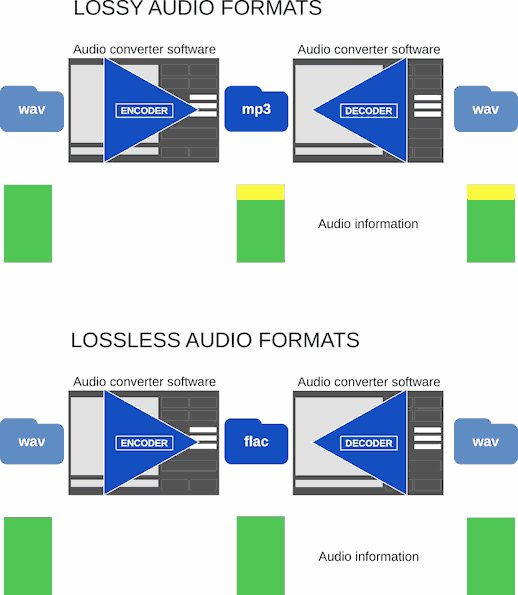
Some sound formats are better for music lovers. They have higher sound quality than other formats.
Sound quality means how much the original music changes after saving into a file.
There are three types of music file formats:
- non-compressed: These formats do not change the original sound at all. They take more space. Examples are: WAV, FLAC (uncompressed), AIFF, ALAC, DSF, DFF, SACD ISO.
- lossless compressed: These formats make the original sound smaller, but keep the same quality. They take less space. Examples are: FLAC, APE, DTS-HD Master Audio, WavPack, DFF, SACD ISO.
- lossy compressed: These formats make the original sound smaller, but also change the quality. They take the least space. Examples are: mp3, AAC, MQA, DTS, OGG, and others.
Read more about lossless formats...
Back to top
Audio codec comparison
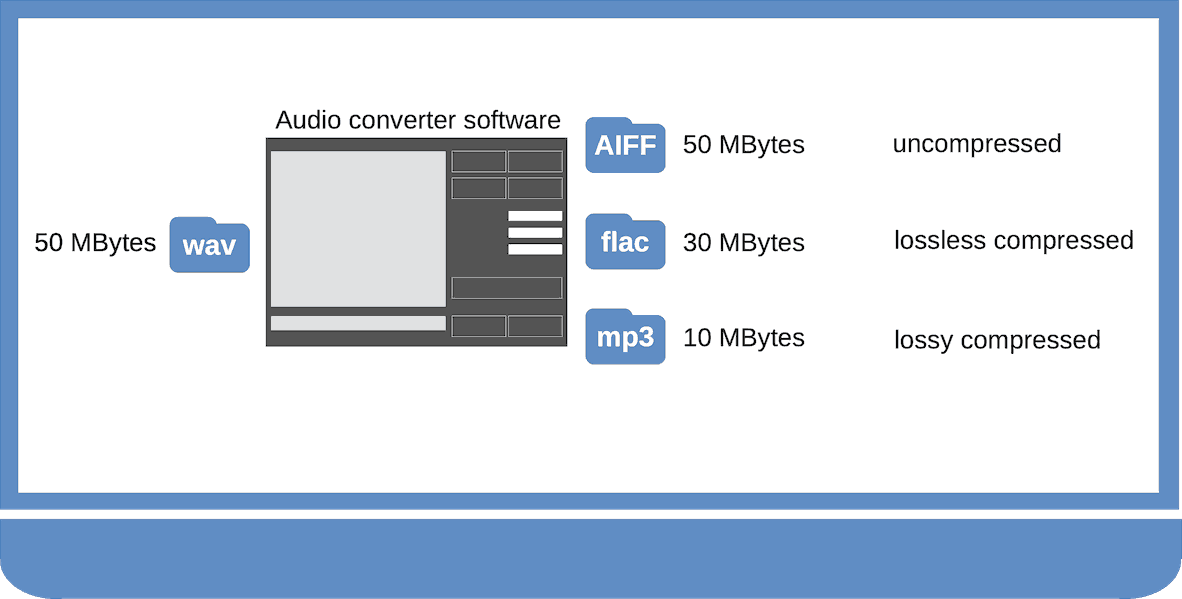
Compressed means smaller audio files. Usually, lossy compression makes files smaller than lossless compression, but some sound is lost.
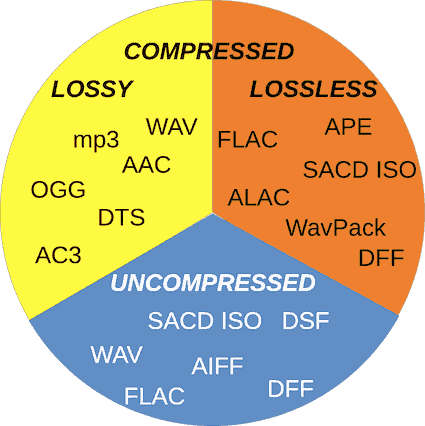
The best sound quality audio formats are called "lossless". They keep the sound quality the same: the original and changed sound data are the same.
Lossless formats can save the original sound without changing it. So, the sound quality of any lossless format (smaller or not) is the same. But, changing between DSD and PCM lossless audio files may lose some sound. For proper PCM to/from DSD conversion, losses are insignificantly small.
![How to choose the best music format for you? [Quick guide. See more below]](/sites/default/files/u1/best-audio-file-format-m.png)
How the sound quality changes when playing
The sound quality of playing is not the same as the audio quality of the music format.
The codec changes the sound quality a bit, but not all of it.
The quality of playing also depends on:
- how the sound was recorded, mixed, and edited;
- the audio format losses;
- the software that plays the sound;
- the device that reproduces the sound.
EXAMPLE:
When we make the sound bigger or smaller, it can play with a different sound quality on the software or device.
Making the sound's resolution bigger or smaller changes the audible distortions a bit. It depends on playback software or device.
So, sometimes, changing the resolution of the audio file can make it playback sound better than the original recording.
Summary: the best sound quality music formats are the ones that do not change the sound at all. But changing the sound resolution or type (DSD to/from PCM) may make the sound quality better when playing. See more...
Back to top
Why different sound formats are need
Music formats are intended for solving different issues:
- maximal sound quality providing;
- saving of hard disk space at a musical device;
- song information (metadata: album artwork, song and album name, performer, etc.) providing;
- maintenance of file compatibility with software and hardware.
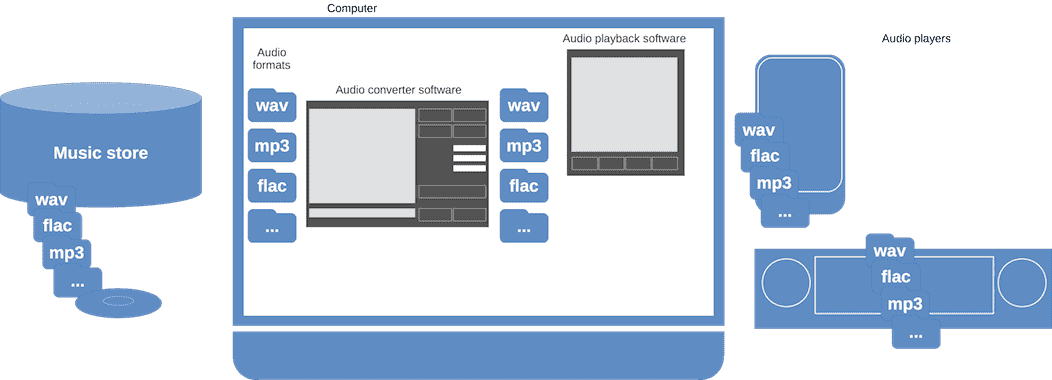
The best music formats (codecs)
- by modulation: DSD and PCM;
- by size compression: compressed and non-compressed:
compressed files by sound quality:
Sound quality does not matter of used operating system (Android, iOS, Windows, Mac, Linux, others) of computer or mobile device. The quality depend on playback system settings rather, including operating system drivers.
Read more:
| loss |
lossy | |
|---|---|---|
| comp |
||
| non-comp |
* MQA format is lossy and lossless for different conditions.
FLAC in the table means "Free Lossless Audio Codec". *.flac file may be used as a wrapper to other formats (MQA, as for an example).
Read more about:
Lossless PCM formats (codecs)
PCM formats (WAV, FLAC, AIFF, ALAC, APE, MQA, CD-audio) may be compressed (lossless or lossy) or not.
Most popular WAV and AIFF may have metadata compatibility issues with audio software and hardware.
What is the best lossless audio format? By sound quality all lossless formats are identical. But there are compatibility and metadata issues. Read the details below.
"Lossless" means "without losses". It refer to audio file size compression.
Original digital-audio data (song) is compressed by size.
If we uncompress the data, it will be absolutelly identical to the original one.
Example: let's original file contains two stars: **. It's 2 symbols in an audio file.
We can agree: "**" is "1".
So, we can compress audio file by size twice when replace "**" to "1".
Before listening to the file, we replace "1" back to "**".
Both original and played back audio are the exactly same: "**".
So, such file-size compression is "lossless" (don't cause losses).
Read more about lossless audio...
Additional stuff:
Investigation of Lossless Audio Compression using IEEE 1857.2 Advanced Audio Coding

WAV
These music files are most popular among uncompressed lossless formats. Lossy compressed audio data may be stored in the *.wav files.
Many sonic devices support this format. But, there are may be issues with metadata displaying at some hardware and software.
WAV can contain DoP packed DSD audio stream. Such files cannot be played back without special pre-processing or hardware.
In general, WAV may be used with editing software, home music library at large hard disks. For the libraries, Free Lossless Audio Codec is more recommended.
WAV have no special limitation by sample rate and bit depth. In standard application, file size is limited 2 GBytes.
WAV RF64 and SONY's WAV64 formats allow to creating WAVs with size more 2 GBytes.
Learn more...
Read WAV vs FLAC...
AIFF
AIFF is popular among uncompressed lossless format.
Many music devices support AIFF. Issues with metadata compatibility may occur.
AIFF may be recommended as an uncompressed format for iTunes. It provides proper metadata for the program.
DoP (DSD audio stream) may be packed to .aiff.
AIFF may be used with audio editors, for audio-file library. But, FLAC is more optimal.
No strong limitation by bit resolution and sampling rate. File size should be lesser 2 GBytes.
There is AIFF-C lossless format for CD-audio tracks. Read the details below.
Free Lossless Audio Codec (FLAC)

FLAC compressed lossless format reduces file size and keep binary audio content without altering. FLAC has compatibility by metadata with many hardware and software.
There are uncompressed FLAC, that some people consider as better sounding. There is a technical hypothesis: why it may be so. But currently no safe evidence. Look details here.
FLAC is not compatible with iTunes player.
Like WAV and AIFF, Free Lossless Audio Codec can contain DoP packed DSD music.
FLAC maximal resolution is 32 bit / 384 kHz and its size may be more 2 GBytes (may depend on used editing and conversion software).
Read FLAC vs WAV...
Apple Lossless Audio Codec (ALAC)

It is losslessly compressed audio file format. The format may be recommended as FLAC replacement for iTunes.
CD audio

Compact disk (CD) contains data in format like WAV 16 bit / 44.1 kHz. Audio data from compact disk may be stored in WAV and other audio files via CD ripper software.
Under Windows at compact disk *.cda files are displayed. But it is index files that contain track time position. *.cda file copying doesn't provide audio stuff extracting. There is need audio ripping software.
Under Mac OSX *.aiff files are displayed at a compact disk. These files may be copied as usual sound files. But these files contain AIFF-C lossless format. It has inverse order of audio bytes, than usual AIFF. AIFF-C may be converted to AIFF without losses.
Read more about CD ripper software >
WMA lossless
WMA (Windows Media Audio) has the lossless ability at codec version 9.
WMA to WAV may be converted via wmal2pcm utility.
The utility may be located at "c:\program files\windows media components\tools\wmal2pcm". Additional installing may be required.
About the pack with WMA codec read here...
Also, check the download page Media Feature Pack for N and KN versions of Windows 10...
APE
APE (Monkey's Audio codec) has the lossless compressing ability. Metadata are supported. Official codec builds, known by the author, for Windows only.
Read details here
WavPack
WavePack is a lossless audio format. Metadata are supported.
Read details here
CAF (lossless)
CAF (Apple Core Audio Format) is file container for lossless audio format (uncompressed PCM or compressed by ALAC codec). Metadata are supported[ref].
Also, see CAF lossy
DVD-A [lossless]
DVD-A (DVD-audio) support uncompressed PCM audio stream: stereo (16|20|24-bit / up to 192 kHz) or 6-channel surround (up to 24-bit / 96 kHz)[ref].
DVD-V [lossless]
DVD-V (DVD-video) support uncompressed PCM audio stream stereo (16|20|24-bit / up to 192 kHz) or DTS 5.1-channel surround (up to 24-bit / 96 kHz)[ref].
MQA (Master Quality Authenticated) [lossless]
MQA is an audiophile PCM format. It conveys lossless high-resolution audio for 17-bit/96 kHz.
Read definitive guide what is better MQA or FLAC?
Back to top
Lossy PCM formats (codecs)

Lossy compressed formats like mp3, aac, ogg and others are intended to save maximal song number into limited hard disk space of musical device (especially mobile phone or portable digital audio player) or computer.
Lossy compressing technologies are balance between audio quality losses and minimal size.
Bitstream characterizes lossy files. The bitstream is bit number of audio information per second. The best bitstream audio quality (kbps / kbit per second) mean minimal file size, but still good sound quality.
As rule lossy files have no metadata compatibility issues.
WAV and AIFF have lossy modifications. But they are not widespread.
What is best audio codec for lossy file? It is unknown exactly, because depending on many factors.
In general, to provide high sound quality of mp3, 256 kbit/s and higher bitrates may be recommended.

How to choose optimal bitrate for lossy formats
The main matter of bitrate is storage space spacing. So we need to choose the minimal bitrate, that gives proper sound quality.
As rule, 256 kbit/sec and more is recommended.
But, if you want to define own optimal bitrate, here step-by-step guide:
- Take several lossless files (FLAC, WAV, AIFF or other) as samples of your preferable musical genres.
- Encode these samples to mp3-audio with different bitrates.
- Compare these mp3 files with its originals by audibility of sound quality difference.
- To future coding, you can use minimal bitrate, that causes a minimal audible difference.
Additions:
- The Effects of MP3 Compression on Perceived Emotional Characteristics in Musical Instruments
- Alexander Benjamin. Music Compression Algorithms and Why You Should Care
- A short study on audio compression
- About AAC format
- AAC audio playback tests (multichannel)
mp3
mp3 is most popular lossy format for music downloads.
AAC
AAC more modern codec than mp3. And AAC developers promise better sound quality, than mp3 (details). Multichannel audio is supported.
WMA lossy
Windows Media Audio (WMA) format is one of the popular lossy codecs, that also have lossless abilities in version 9.
DTS
dts format allows storing multichannel compressed audio.
AC3
ac3 supports multichannel data compressed recordings.
CAF [lossy]
CAF (Apple Core Audio Format) is file container for lossy audio formats (compressed by AAC, mp3 and other codecs). Metadata are supported[ref].
Also, see CAF lossless
MQA (Master Quality Authenticated) [lossy]

MQA is a PCM format. Looks like, it provides better size compression than FLAC (see here). But MQA is lossless for 17-bit/96 kHz resolution (see details). Of course, MQA losses are minimal to provide high sound quality.
MQA may be played back without decoding with lesser (than MQA's maximal) sound quality. It provides its compatibility with non-MQA software and hardware.
Learn what is better MQA or FLAC?
Read more about MQA.
DVD-V (lossy)
DVD-V (DVD-video) supports data compressed Dolby Digital (AC-3) or DST codec stereo / 5.1 multichannel[ref].
Back to top
DSD formats

DSF, DFF, SACD ISO (*.iso) are lossless DSD formats based on 1-bit sigma-delta modulation.
This format allows to using simplified (in concept) digital-to-analog converters, comparing PCM ones.
DFF and SACD ISO (file-image of SACD optical disk) may be DST compressed.
DSD audio content may be packed in DoP format (not compressed). DoP is stored in lossless PCM files (WAV, FLAC).
Metadata
As rule, DFF has metadata displaying issues for playback tools. SACD ISO contains text metadata only.
Stereo and multichannel
SACD ISO may contain 2 variants of single album stereo and multichannel. It causes consuming of additional space at hard disk.
To avoid the consuming SACD ISO may be extracted to DSF files with the certain channel number. As an example, for a stereo digital audio player, stereo album variant is the best option.
Also, SACD ISO file doesn't contain album artworks.
Read more about SACD ISO...
Back to top
Bluetooth audio codecs
Wireless Bluetooth protocol uses several types of audio codecs. They are need to improve sound quality and latency for available throughput ability of the wireless equipment.
| Name | Max |
Latency | Reso |
Remark |
|---|---|---|---|---|
| AAC | up to 250 kbps | |||
| LDAC | up to 990 kbps | about 250...550 ms | up to 24 bit 96 kHz |
bit |
| LHDC | up to 900 kbps | up to 96 kHz | ||
| LLAC / LHDC LL | 400 / 600 kbps | 30 ms | up to 24-bit 48 kHz | |
| AptX | up to 352 kbps | |||
| AptX HD | up to 576 kbps | 170 ms | 24-bit 48 kHz | |
| AptX LL | up to 40 ms | |||
| AptX Adaptive | 279 ... 420 kbps | 80 ms | back |
|
| AptX Loss |
lossless 44.1 kHz 16 bit, lossy 24-bit / 96kHz | introduced by Qualcom in 2021 | ||
| SBC | up to 320 kbps | |||
| LC3 | 160 kbps or 80 kbps for each of 2 stre |
multi-stream sup |
||
| Sam |
lost audio data management |
Is LDAC better than aptX?
Looks like, LDAC has not lossless ability. In contrast, AptX lossless can it. However, LDAC supports 24 bit / 96 kHz. AptX in lossless mode supports CD quality only (44.1 kHz / 16 bit).
Theoretically, high resolution brings better sound quality. But, many factors impact to sound quality. Read more...
F.A.Q.: aptX codec LDAC codec
Back to top
Audio formats for iTunes
iTunes audio player software allows to playback both audiophile and lossy formats. But there is a limitation: iTunes don't play FLAC and DSD files. Also, iTunes can't read WAV metadata.
FLAC may be replaced to Apple Lossless Codec (ALAC with *.m4a extension).
WAV may be replaced to AIFF. However, metadata (text and artwork) should be stored in a format compatible with iTunes.
Back to top
What is the best music formats? Conclusions
When you choose the best audio format for the sound quality of your music library, it needs to consider:
- compatibility with used software and hardware;
- desirable sound quality (maximal for your audio system);
- desirable number songs in limited hard disk space of computer or musical device.
What is the best lossy audio format
For audiophiles, lossless formats may be recommended: DSF, FLAC, ALAC (*.m4a), WAV, AIFF, CAF files.
DFF and WAV may have metadata compatibility issues.
What is the best lossy audio format
To saving more songs at disk it is recommended to use mp3, aac, ogg. AAC is promised as the best sounding than mp3 (see above).
Other issues
To save hard disk space at digital audio players (DAP) and mobile phones, extract stereo tracks from SACD ISO. Alternatively, downmix multichannel tracks to stereo.
Operating system of computer or mobile phone doesn't impact to sound quality of played back files. It is a matter of playback settings rather.
Read where to get free downloads:
Frequently Asked Questions
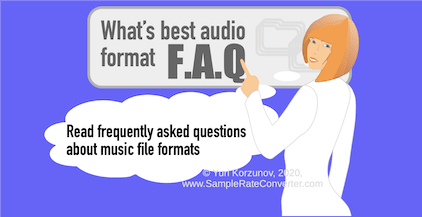
Read this F.A.Q. about audio file formats (codecs), and read details below.
F.A.Q. audio codec [general]
What is the best audio codec? Which audio codec is best?
Popular audio file formats (file extensions):
- WAV | WAV RF64 | WAV BWF (.wav)
- FLAC (.flac)
- AIFF (.aiff, .aif)
- mp3/MPEG (.mp3)
- AAC (.m4a)
- ALAC (.m4a)
- WavPack (.wv)
- DSD (.dsf, .dff)
- DSD DoP (.wav, .flac)
- MQA (.flac)
- more...
Download free music files...
The best audio codec is defined according to your aims: sound quality and data compression ability.
Read details...
What is the highest quality audio format?
To know shat is the highest-quality format for audio, we are need to find out format that keeps full audio quality. The best formats for demanding audiophiles are lossless formats (WAV, FLAC, AIFF, ALAC, DSF, DFF, others), that are capable save original sonic data without losses. So, these formats can be considered as the best for the audibility.
Question "what is the best DSD or PCM" has no single answer. It depends on implementation of equipment and played recording.
From point of view of format-resolution-abilities expanding, WAV and AIFF give great abilities due to flexible file structure.
What audio format is the best for sound quality?
Best sound quality is provided by audio formats without losses of information. They are so-called "lossless" formats.
Read more...
What is the most common audio codec?
There are several most common audio codecs for different applications:
| Codec | Applications |
|---|---|
| WAV | Hi-res music |
| FLAC | Hi-res music |
| DSD | Hi-res music |
| mp3 | Music files, movie |
| AAC | Music files, movie, bluetooth |
| Dolby Digital | Movie |
What is the best audio format for sound quality?
The best sound-quality audio formats are lossless ones. These formats keep source musical data without losses.
If you uses hi-fi equipment, these formats are most recommended. For mobile applications, AAC format in high bitrates (256 kbps nad more) may be recommended.
Read more about audio formats with maximal audio quality...
Which is the best sound quality?
Sound quality has 2 definitions:
- [objective] distortion level;
- [subjective] how it sounds - nice or not.
At the first sight, the subjective definition may not be estimated. But, it wasn't.
Both definitions are united by psychoacoustics.
Read more about the sound quality...
Does high res audio sound better?
It is a matter of audio equipment and played back recording. High resolution gives the potential abilities to achieve a better result for designers of audio equipment and software,
What is the best format for music?
Music requires maximum abilities, that can provide audio formats (codecs).
Lossless file formats in high resolution are recommended, as default.
But, for portable audio players and mobile phones, high bitrates (256 kbps and higher) are recommended for stereo recording, which is compressed by lossy codecs (mp3, AAC).
What is the most popular audio format?
According to Google statistics (April 2019), mp3 is the most popular format (among mp3, WAV, FLAC, ALAC, m4a, AAC). Second place - m4a, WAV, AAC. ALAC and FLAC are in the 3-rd position. m4a is a container for AAC and ALAC.
What is the best sounding audio file format?
To achieve maximal sound quality use lossless files.
What best audio file format for editing?
The best audio-file formats for editing are lossless non-compressed PCM files (WAV, AIFF).
What best audio codec?
Lossless codecs (FLAC, WAV, AIFF) are preferable here. It does not matter whether compressed or not.
The developer of mp3 recommends to using AAC instead.
F.A.Q. MQA audio
Where can I download MQA music?
You can found download sites with MQA music here (see "Description" column)...
Is MQA better than CD?
When we go to buy a downloads, we want to know does MQA the best in comparison with CD? MQA is format supporting high-resolution. MQA decoding with spectrum unfolding provides HD audio. It may give some advantages, that high-resolution technologies bring. However, recording quality and implementation of used listening system is matter in comparison hi-res vs. CD.
Read more...
Is MQA better than FLAC?
Both MQA and FLAC support high resolution. However, FLAC is a lossless format. It means that both coded and decoded binary content are identical. But, as far as the author know, Master Quality Authenticated is not a lossless format in this meainig. However, MQA provides high audibility. Thus, we can compare certain recording played back on certain hardware/software.
Read detailed guide MQA or FLAC?
Can normal CD player play MQA CD?
Ordinary CD player can play MQA CD. "Unfolded" MQA is compatible with ordinary playback systems.
Read details...
F.A.Q. Advanced Audio Coding
Is WAV better than AAC?
WAV is lossless format. AAC is lossy format. Technically, WAV is better than AAC by sound quality.
High AAC bitrates may be undistinguished with original WAV.
Is M4A better than WAV?
WAV is lossless format. M4A can contain either AAC or ALAC. AAC is lossy format. ALAC is losssless one.
ALAC and WAV are providing the identical sound quality. At high bitrates (250 kbps and above), it's very difficult to distinguish AAC and WAV.
Is AAC good quality?
Despite AAC is desined as lossy codec, it provides high quality at high bitrates. In instance, above 250 kbit per second.
Is AAC the best audio codec?
AAC is lossy codec. Technically, lossless ones is better choice. However, AAC save bitrate better than any lossless one (at moment of the aswer writing). And high-bitrate AAC is good for hi-fi sound quality.
So, AAC may be recommended for mobile applications and streaming.
Is 256 kbps AAC is good quality?
Yes. 256 Kbps may be recommended for hi-fi sounding of stereo Advance Audio Coding.
Is 320 kbps good sound quality?
Yes. Stereo mp3 or AAC 320 kbps is very similar to FLAC and WAV in the same audio resolution (sample rate and bit depth). General recommendation is 256 kbps or higher for stereo mp3 or AAC.
If you use AAC in higher resolutions or multichannel audio, higher bitrate may be desirable.
General advice: try different bitrates for same original recording(s). If you hear no difference with the original recording, use this bitrate.
Which is better mp3 or AAC?
AAC designers state, that AAC better accommodated psychoacoustical factors, than mp3. So AAC is more recommended.
Actually, you can compress original lossless file to mp3 and AAC at different bitrates (256 kbps and above). Compare these files with the original by your ears.
If you don't hear difference, use mp3 or AAC, according compatibility of your audio player or software.
If you prefer high resolution audio or multichannel recordings, you can use AAC instead mp3. Because last one is limited 48 kHz / 16 bit stereo.
Is AC3 better than AAC?
Both AC3 and AAC are lossy audio formats.
At high bitrates, probability listening of difference is low. Also, listened audio system is matter.
AAC is newer format. And, it's promissed as a good format for high-resolution recordings.
Which is better WAV or AAC?
AAC is lossy format. WAV is lossless one. Lossless format is very recommended for audiophile applications. Also, WAV supports higher sampling rates.
Read more...
F.A.Q. mp3
Is WAV better than mp3?
WAV is lossless format and keep all auidio information. So it causes lesser distortions than lossy mp3. However, high mp3 bitrates (256 kbps and above) are very close to lossless source file (low distortions) and keep space, that is important for mobile applications.
However, mp3 don't support sampling rates above 48 kHz and can't use sound quality abilities of hi-res audio devices.
F.A.Q. aptX
Is aptX better than AAC? Which is better aptX or AAC?
Technically for Bluetooth[*], provided bitrates are:
- AAC - up to 250 kbps,
- AptX - up to 352 kbps,
- AptX HD - up to 576 kbps.
All are lossy formats.
AptX gives better potential due to higher bitrate. As default, we can prefer an audio format with higher bitrate. But, only you can estimate real advantages in your personal case.
Which aptX codec is best?
aptX codec for wireless applications has several types:
- aptX [latency 170 ... 270 ms];
- aptX (HD) [supports 24-bit / 48 kHz with maximum bitrate 567 kbps, latency 170];
- aptX LL [latency up to 40 ms];
- aptX Adaptive [adaptive bitrate 279 ... 420 kbps with low latency 80 ms, backward compatible with aptX and aptX HD];
- aptX Lossless [introduced by Qualcom in 2021, lossless 44.1 kHz (CD-quality audio) / 16 bit or 24-bit / 96kHz lossy].
If you use wireless headphones for music production or games, aptX LL may be recommended due to low latency.
For music listening, aptX (HD) / Adaptive / Lossless may be recommended.
Which Bluetooth audio codec is the best?
You can get plenty opinions what Bluetooth audio codec is the best. If you have possibility to listen and compare codecs, do it to get personal opinion. Modern wireless codecs are good and their difference is subtle enough.
In common, recommended codecs:
Read more...
Is AAC or aptX better?
For Bluetooth aptX/aptX(HD) should provide up to 352/576 kbps, respectively. AAC provides up to 256 kbps. Theoretically, higher bitrate may be more able to bring higher sound quality. However, it may be rather matter your mobile phone and headphones. Test it for yourself.
AAC requires more computing resources than SBC or aptX, and, respectively, tend to higher consuming of battery energy [*].
F.A.Q. players
What the best audio file format for iTunes?
- To maximize sound quality use lossless AIFF and ALAC (*.m4a).
- Convert similar lossless audio files to mp3 and m4a and compare its sound.
- Bitrates 256 kbps and above are recommended.
What best audio file format for mobile phones, iPhone, iPad?
If internal phone/tablet's DAC is used, lossless PCM formats are preferable.
Some external DACs support DSD.
Compare your audio player app sound for DSD and PCM lossless formats.
What best audio format for movies?
Lossless multi-channel sound formats (Dolby TrueHD, DTS-HD Master Audio) are recommended for home music systems.
To keep hard disk space DTS support lossy compression.
Also, lossy AC3 may be used.
Lossy compression is recommended to web and portable applications.
What best audio file format for car CD player?
If car stereo supports FLAC or WAV files, these files give maximal quality.
F.A.Q. streaming
What best audio file format for website and web?
In general, it is compressed formats: mp3, m4a, ogg, flac.
Read more about online streaming...
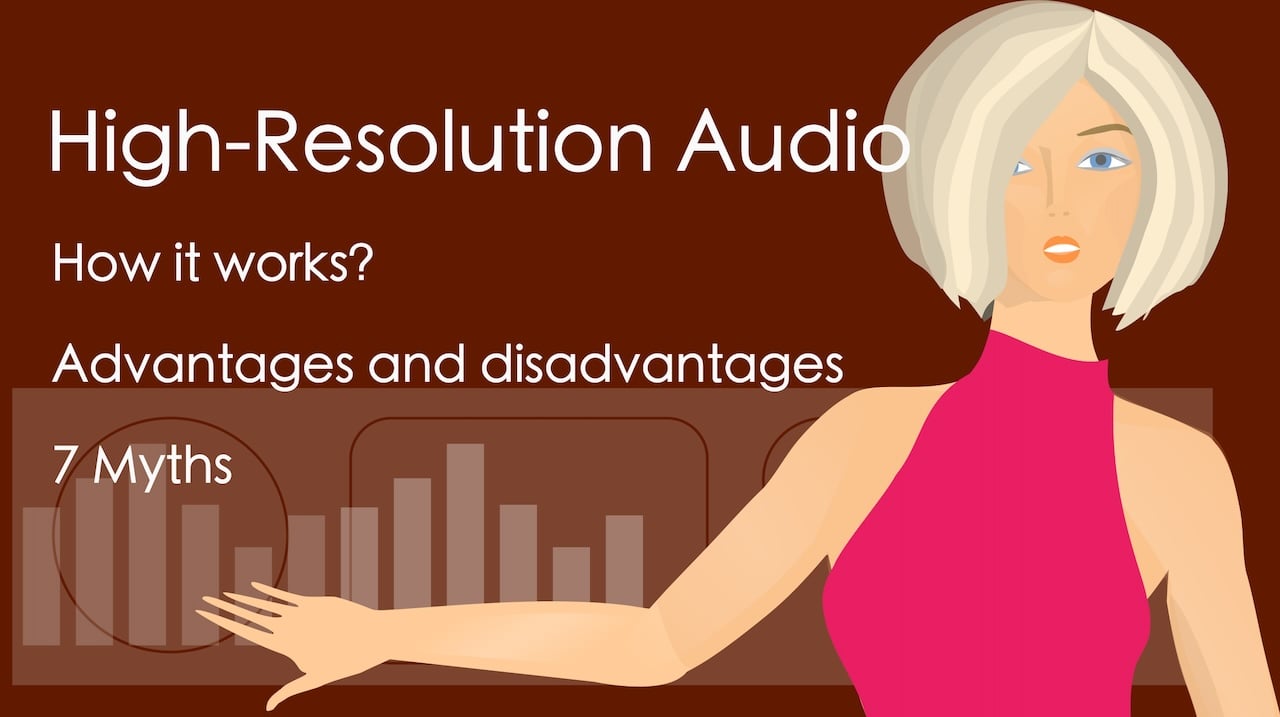
Audio Basis - articles about audio
Back to top